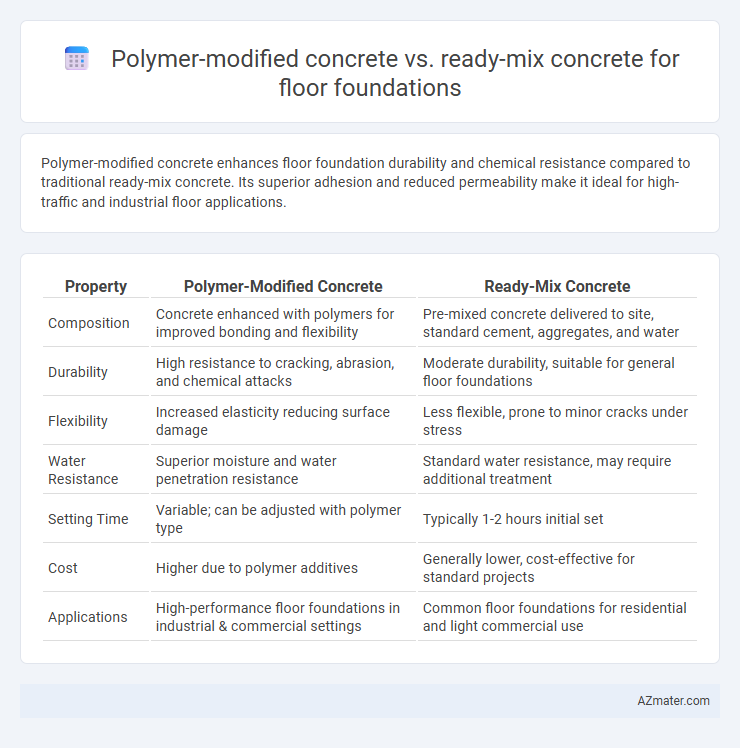Polymer-modified concrete enhances floor foundation durability and chemical resistance compared to traditional ready-mix concrete. Its superior adhesion and reduced permeability make it ideal for high-traffic and industrial floor applications.
Table of Comparison
| Property | Polymer-Modified Concrete | Ready-Mix Concrete |
|---|---|---|
| Composition | Concrete enhanced with polymers for improved bonding and flexibility | Pre-mixed concrete delivered to site, standard cement, aggregates, and water |
| Durability | High resistance to cracking, abrasion, and chemical attacks | Moderate durability, suitable for general floor foundations |
| Flexibility | Increased elasticity reducing surface damage | Less flexible, prone to minor cracks under stress |
| Water Resistance | Superior moisture and water penetration resistance | Standard water resistance, may require additional treatment |
| Setting Time | Variable; can be adjusted with polymer type | Typically 1-2 hours initial set |
| Cost | Higher due to polymer additives | Generally lower, cost-effective for standard projects |
| Applications | High-performance floor foundations in industrial & commercial settings | Common floor foundations for residential and light commercial use |
Introduction to Concrete Types for Floor Foundations
Polymer-modified concrete enhances traditional concrete by incorporating polymers to improve adhesion, flexibility, and durability, making it ideal for floor foundations exposed to heavy loads or harsh conditions. Ready-mix concrete is pre-batched and delivered to the site, offering consistent quality and saving time in construction but may have limited customization for specific floor foundation requirements. Choosing between polymer-modified and ready-mix concrete depends on the project's structural demands and environmental exposure.
Overview of Polymer-Modified Concrete
Polymer-modified concrete integrates polymers into the cementitious matrix to enhance adhesion, flexibility, and water resistance, making it highly suitable for floor foundations subjected to heavy loads and environmental stress. This modification improves crack resistance and durability compared to conventional ready-mix concrete, which relies solely on cement, aggregates, and water. The result is a more resilient floor foundation that offers extended lifespan and reduced maintenance costs.
Overview of Ready-Mix Concrete
Ready-mix concrete is a pre-mixed, factory-produced mixture of cement, aggregates, water, and admixtures designed to ensure consistent quality and strength for floor foundations. It offers high durability, workability, and faster installation compared to traditional on-site mixing, making it ideal for large-scale construction projects. The controlled batching process minimizes errors and enhances uniformity in the concrete's properties, supporting robust load-bearing floor foundations.
Key Differences in Material Composition
Polymer-modified concrete incorporates synthetic polymers like latex or epoxy to enhance bonding strength, flexibility, and water resistance, making it ideal for high-performance floor foundations. Ready-mix concrete consists primarily of cement, water, aggregates, and admixtures, providing consistency and convenience but lacking the enhanced durability properties of polymer additives. The key difference in material composition lies in the presence of polymers, which improve adhesion, reduce permeability, and increase impact resistance in polymer-modified concrete compared to traditional ready-mix concrete.
Strength and Durability Comparison
Polymer-modified concrete incorporates polymers that enhance tensile strength, reducing permeability and improving adhesion compared to traditional ready-mix concrete, making it superior for floor foundation applications requiring high durability. Ready-mix concrete offers consistent compressive strength and ease of placement but typically lacks the enhanced flexibility and chemical resistance provided by polymer additives. The improved bonding and reduced micro-cracking of polymer-modified concrete result in greater long-term durability under heavy loads and exposure to harsh environmental conditions.
Workability and Application Methods
Polymer-modified concrete exhibits enhanced workability due to the incorporation of polymers, which improve adhesion, flexibility, and resistance to cracking, making it ideal for complex floor foundation shapes and surfaces. Ready-mix concrete, while consistent and convenient, may require onsite admixtures to achieve similar workability and is generally easier to apply with standard pouring and finishing methods. The choice between the two depends on specific foundation requirements, with polymer-modified concrete offering superior durability for high-performance floors and ready-mix providing efficient application for routine projects.
Setting Time and Curing Requirements
Polymer-modified concrete typically exhibits faster setting times compared to ready-mix concrete, allowing for quicker construction progress in floor foundation applications. Its curing requirements often involve controlled moisture conditions to ensure optimal polymer film formation, enhancing durability and adhesion. Ready-mix concrete requires longer curing periods, usually 7 to 28 days, with consistent hydration to achieve standard strength and minimize cracking risks.
Cost Analysis and Economic Considerations
Polymer-modified concrete generally exhibits higher upfront costs due to the inclusion of polymers that enhance durability and chemical resistance, making it suitable for floors subjected to heavy loads or aggressive environments. Ready-mix concrete offers cost efficiency through mass production and reduced labor on-site, which can lower the initial expenditure for standard floor foundations. Economic considerations favor polymer-modified concrete in long-term maintenance savings and lifespan extension, whereas ready-mix concrete is often preferred for budget-sensitive projects with typical load demands.
Environmental Impact and Sustainability
Polymer-modified concrete for floor foundations reduces carbon emissions by enhancing durability and extending service life, minimizing the need for repairs and replacements compared to ready-mix concrete. Ready-mix concrete, while convenient, typically generates higher CO2 emissions due to frequent batching and transport, increasing the overall environmental footprint. Selecting polymer-modified concrete supports sustainable construction practices by lowering waste generation and improving energy efficiency throughout the building's lifecycle.
Best Use Cases: Choosing the Right Concrete for Floor Foundations
Polymer-modified concrete offers enhanced adhesion, flexibility, and chemical resistance, making it ideal for industrial floor foundations exposed to heavy loads and harsh environments. Ready-mix concrete provides consistent quality and faster installation, suitable for residential and commercial floor foundations where standard strength and durability are required. Selecting the right concrete depends on specific site conditions, load requirements, and exposure to chemicals or moisture.

Infographic: Polymer-modified concrete vs Ready-mix concrete for Floor foundation
 azmater.com
azmater.com